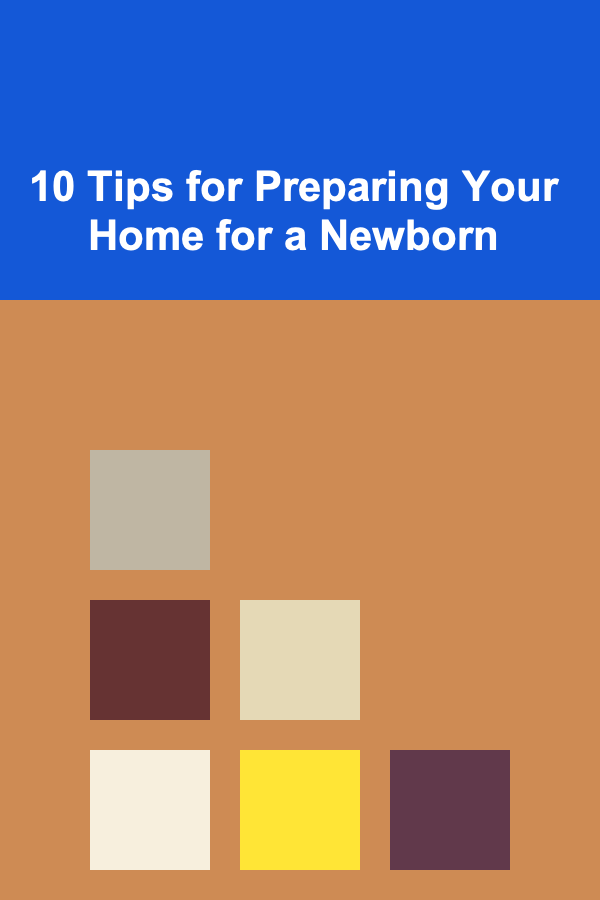
10 Tips for Preparing Your Home for a Newborn
ebook include PDF & Audio bundle (Micro Guide)
$12.99$8.99
Limited Time Offer! Order within the next:

The arrival of a newborn is one of the most exciting and life-changing events for any family. As you prepare to welcome your little one into your home, there are numerous practical steps to take to ensure that your living space is safe, comfortable, and functional for both your newborn and the entire family. While the process of preparing for a newborn can seem overwhelming, breaking it down into manageable steps can make it more achievable and rewarding.
In this article, we'll explore 10 essential tips to help you prepare your home for the arrival of your newborn. These tips range from ensuring safety and comfort to creating a nurturing environment that promotes bonding and well-being for both parents and baby.
Set Up a Safe Sleeping Environment
Creating a safe and comfortable sleeping space for your newborn is one of the most critical steps in preparing your home. Babies sleep for a significant portion of their early days, so ensuring their sleep environment is safe is paramount.
Key Considerations:
- Crib Safety: Choose a crib that meets current safety standards. Avoid cribs with drop-side rails, and make sure the slats are no more than 2 3/8 inches apart to prevent suffocation hazards. A firm mattress and a well-fitted crib sheet are essential, with no soft bedding, pillows, or stuffed animals in the crib to reduce the risk of suffocation.
- Bassinet or Co-Sleeper: Some parents prefer a bassinet or co-sleeper for the early weeks or months. This allows the baby to sleep close to the parents while keeping the sleep space safe and separate.
- Room Sharing: The American Academy of Pediatrics recommends room-sharing with your baby (but not bed-sharing) for the first six months to reduce the risk of Sudden Infant Death Syndrome (SIDS).
Design Tip:
- Keep the crib in your bedroom for easy nighttime feedings, but make sure it is far enough from any cords, blinds, or windows that could pose a hazard.
Baby-Proof the Entire Home
Newborns are naturally curious, and as they grow, they will quickly begin to explore their surroundings. While you might not need to baby-proof every room of your house immediately, it's a good idea to start with the basics well before your baby is mobile.
Key Areas to Focus On:
- Electrical Outlets: Install outlet covers or use tamper-resistant outlets to prevent the baby from inserting objects into them.
- Furniture: Anchor heavy furniture, such as bookshelves or dressers, to the wall to prevent tipping hazards.
- Sharp Corners: Use corner protectors on furniture like coffee tables or low tables that have sharp edges.
- Cleaning Supplies: Store cleaning products, medications, and other toxic substances in locked cabinets, out of reach from your baby.
Design Tip:
- Keep small, choking hazards such as coins, batteries, and small toys out of reach. Store baby gear in cabinets or shelves that are inaccessible to your newborn.
Organize and Declutter
The arrival of a newborn often comes with an influx of baby gear, clothes, and other essentials. While the excitement of setting up the nursery is fun, it's also important to ensure that your home remains organized and clutter-free, both for safety and practicality.
Organizing Baby Essentials:
- Storage Solutions: Invest in storage bins, shelves, and drawers to organize baby clothes, diapers, wipes, and other necessities. Consider labeling bins so that you can easily find what you need when you need it.
- Changing Station: Set up a designated changing area with everything you'll need, such as diapers, wipes, creams, and a spare change of clothes. Make sure that this area is organized and easy to access.
- Essentials at Hand: Keep baby essentials, like burp cloths, pacifiers, and bottles, close by to avoid having to search for them during stressful moments.
Design Tip:
- Create a baby-friendly, clutter-free space by making use of vertical storage or multifunctional furniture (like a changing table that doubles as storage).
Create a Feeding Station
Feeding your newborn, whether through breastfeeding or formula feeding, will be a frequent activity. Setting up a dedicated feeding station can make nighttime feedings and daytime sessions more comfortable and efficient.
What to Include in the Feeding Station:
- Comfortable Chair: A comfortable rocking chair, glider, or nursing chair with good back and arm support can make feedings more comfortable for you.
- Feeding Essentials: Keep all feeding necessities within arm's reach, including bottles, breast pump (if applicable), burp cloths, formula, and snacks for the parents.
- Lighting: Soft, dim lighting is important for nighttime feedings to avoid disturbing the baby's sleep cycle. A bedside lamp with a dimmable feature can be ideal.
Design Tip:
- Make sure the feeding area is cozy, quiet, and calming, as this helps both baby and parents relax during feeding time.
Set Up a Diapering Area
Diapering will become a regular part of your routine once your baby arrives, so it's important to set up an efficient and organized diapering station. You'll likely change dozens of diapers each day in the early weeks.
Diaper Station Essentials:
- Changing Table: A dedicated changing table or a changing pad on a flat surface is essential. Ensure it has safety straps to keep your baby secure while changing.
- Diapers and Wipes: Stock up on diapers in various sizes and keep them in an easily accessible location. Wipes and diaper creams should be within reach, too.
- Extra Clothes: Accidents happen, so keep a few extra sets of clothes in the diapering area for quick changes.
Design Tip:
- If space is limited, consider using a changing pad on top of a dresser or adding a diaper pail with a lid to contain odors.
Prepare for Baby's Bath Time
Before the baby arrives, make sure you have a safe and comfortable space for bath time. Newborns are typically bathed in a small infant tub until they are old enough to sit up on their own.
Bath Time Essentials:
- Baby Bathtub: Invest in an infant bathtub with a supportive design to keep your baby comfortable and safe during baths.
- Soft Towels: Stock up on soft, absorbent towels to wrap your baby after their bath.
- Baby Wash and Shampoo: Use gentle, tear-free baby washes and shampoos that are designed specifically for newborns' sensitive skin.
- Hooded Towels: Hooded towels are perfect for keeping your baby warm and cozy after bath time.
Design Tip:
- Ensure that the bathroom is warm enough for bath time, as newborns can get cold quickly.
Stock Up on Baby Clothes and Linens
Newborns grow quickly, and you'll go through a lot of clothes and linens in the first few months. Make sure you have enough essentials in a variety of sizes to keep your baby comfortable and clean.
Essentials to Buy:
- Onesies and Sleepers: Soft, easy-to-put-on onesies and sleepers are ideal for newborns. Consider buying a few with snap buttons for easy diaper changes.
- Swaddles: Swaddling helps babies feel secure and cozy. Stock up on swaddle blankets or sleep sacks to promote good sleep.
- Bedding: A few crib sheets, a baby blanket, and waterproof mattress protectors are essential for the crib.
- Booties and Mittens: Newborns often have sharp nails, so mittens can help prevent scratching. Soft booties will keep their feet warm.
Design Tip:
- Organize baby clothes by size, making it easier to access the right items as your baby grows.
Prepare Your Home for Visitors
In the early weeks after the baby arrives, friends and family will likely want to visit to meet the newborn. While you may be eager for the support and love from loved ones, it's important to establish boundaries and prepare your home for these visitors.
Tips for Managing Visitors:
- Visitor Guidelines: Consider setting up visitor guidelines that prioritize your baby's health and your recovery. For example, ask visitors to wash their hands before holding the baby, or limit the number of visitors at a time.
- Rest and Quiet Time: Make sure you have a comfortable space to retreat to when you need rest or quiet time. Newborns need a lot of sleep, and parents do too.
Design Tip:
- Create a designated visitor area where family and friends can sit comfortably but where you're not overwhelmed with constant visits.
Make a Plan for Postpartum Support
The weeks after childbirth can be overwhelming, both physically and emotionally. Preparing for postpartum recovery is just as important as preparing for the baby's arrival.
Considerations:
- Family Support: Coordinate with family or friends to provide help with cooking, cleaning, and childcare during your postpartum period.
- Self-Care: Ensure that you have access to self-care items, such as comfortable clothing, healthy snacks, and items that help with recovery, like postpartum pads and pain relievers.
Design Tip:
- Set up a comfortable resting space with cozy blankets, pillows, and your favorite books or entertainment for those moments of downtime.
Stock Up on Newborn Necessities
In addition to baby clothes, feeding equipment, and bedding, there are several other essentials you'll need to have on hand for your newborn's care.
Newborn Necessities to Stock Up On:
- Diapers: Newborns go through a lot of diapers, so have a supply of both disposable or cloth diapers ready.
- Baby Gear: A stroller, car seat, and baby carrier will be essential for outings. Make sure your car seat is installed correctly before the baby arrives.
- Baby Monitor: Consider investing in a baby monitor to keep an eye on your newborn when they're in another room.
Design Tip:
- Make sure you have a system for organizing baby gear so you can easily access it when needed.
Conclusion
Preparing your home for a newborn can be a daunting task, but by breaking it down into manageable steps and staying organized, you can create a safe, comfortable, and welcoming environment for both you and your baby. From establishing a safe sleeping area to stocking up on essentials, each step is an opportunity to ensure that your home is ready for the exciting new chapter in your life.
By following these 10 tips, you'll be able to feel more confident and prepared as you await your newborn's arrival. As your baby grows, so too will your home evolve to meet their needs, but starting with these foundational steps will ensure that you're ready for whatever comes your way.
Reading More From Our Other Websites
- [Personal Care Tips 101] How to Choose Lip Balm with Essential Oils for Extra Nourishment
- [Metal Stamping Tip 101] Cost‑Effective Strength: How Metal Stamping Reduces Production Expenses for Fasteners
- [Organization Tip 101] Top Router Bit Sets for Beginners in Woodworking
- [Stamp Making Tip 101] Hot Glue Hacks: Durable, Easy-Release Stamps for Scrapbooking & Cardmaking
- [Toy Making Tip 101] From Paper to Plush: Crafting Custom Soft Toys Using Cricut's Precision Cutting
- [Beachcombing Tip 101] Beachcombing 101: Essential Gear and Safety Tips for First‑Time Explorers
- [Home Maintenance 101] How to Properly Maintain Your Water Heater for Longevity
- [Home Staging 101] How to Stage Your Home to Maximize Storage and Organization
- [Home Cleaning 101] How to Clean an Oven: Effortless Ways to Keep It Clean
- [Survival Kit 101] Survival Kit Essentials: A Step-by-Step Guide to Preparing for the Unexpected

How to Analyze Forex Markets for Better Trading Decisions
Read More
How to Plan an Interior Design Project in Budget-Friendly Ways
Read More
How to Avoid Burnout in a Remote Job: A Comprehensive Guide
Read More
How to Get Started with Freelance Income
Read More
How to Claim Education Tax Credits for Online Courses and Programs
Read More
Workday Reporting Checklist: 10 Tips for Accuracy
Read MoreOther Products

How to Analyze Forex Markets for Better Trading Decisions
Read More
How to Plan an Interior Design Project in Budget-Friendly Ways
Read More
How to Avoid Burnout in a Remote Job: A Comprehensive Guide
Read More
How to Get Started with Freelance Income
Read More
How to Claim Education Tax Credits for Online Courses and Programs
Read More